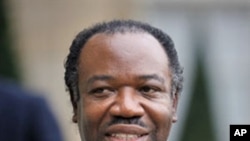Gabon’s President Ali Ben Bongo Ondimba says he will continue working closely with the African Union as well as the United Nations Security Council to resolve conflicts on the African continent. He said he attributes his country’s peace and stability to open dialogue among Gabonese in resolving problems affecting the central African country.
Gabon, which gained its independence from former colonial power France in 1960, has enjoyed peace and stability despite a failed attempted coup d’état in the early years of independence.
The former French colony seems not to have been affected by the frequent instability and conflicts that have destabilized its neighbors in the Central African region. At a recent news conference at the presidential palace in the capital, Libreville, President Bongo Ondimba said the Gabonese jealously guard their peace through open dialogue.
"It is true that we have enjoyed stability and peace (for the) last four decades. We’ve had also our problems in the 60’s. There was an attempt of coup that failed, thanks God. But, I think after that, we were able to learn some lessons. And, it was mainly also due to President (Omar) Bongo’s (Ondimba) policy of engaging. (Late) President Bongo Ondimba was someone who talked to anyone. One reason of our success is we talk to one another even if we do not get along as it happens everywhere. We do have our problems. We quarrel, but we talk. And, it’s important to do that."
President Bongo Ondimba said many Gabonese have witnessed the devastation that conflicts have had on neighboring countries and have tried not to take for granted the prevailing peace their country has enjoyed over the years.
“We also, as a people, were sensitive enough to realize that based on what we were seeing happening in the developing world, and also in Africa, we wanted something different. So, all Gabonese know that peace is the most important treasure that we have. Without it, (there) would be chaos. So, we then put ourselves through some limits, and now others say that Gabonese political leaders are being wise enough to respect those limits.”
Earlier this year, the African Union declared 2010 the African Year of Peace, reiterating the continental body’s commitment to further push the peace process in Africa, where millions of people are estimated to have been killed and many more displaced due to conflict. President Bongo Ondimba said his country is willing to work with the African Union, as well as the U.N. Security Council, to help resolve conflicts on the African continent.
“We are a peace-loving country and we will always try to help others to enjoy what we’ve had all these years through (the) African Union, of course, but also the United Nations, but, first, with the African Union. So, we are talking to other leaders to make sure that this message of peace (goes on). Talking about peace might not be exciting…some say you don’t eat peace, but without peace you don’t eat at all.”
However, critics say despite the peace that Gabon has enjoyed over the years, the country’s leadership tightly controls the political space, thus severely restricting the opposition from actively participating in the democratic process.
They also questioned the election of President Bongo Ondimba who is the son of the late long-time President Omar Bongo, who ruled Gabon for nearly three decades until his death in 2009.
Opponents say the country was treated like a family property accusing the late Mr. Bongo of “bequeathing” Gabon to his son. But, supporters say President Ali Ben Bongo Ondimba won a legitimate election described by poll observers as free and transparent, despite reported isolated cases of intimidation.




